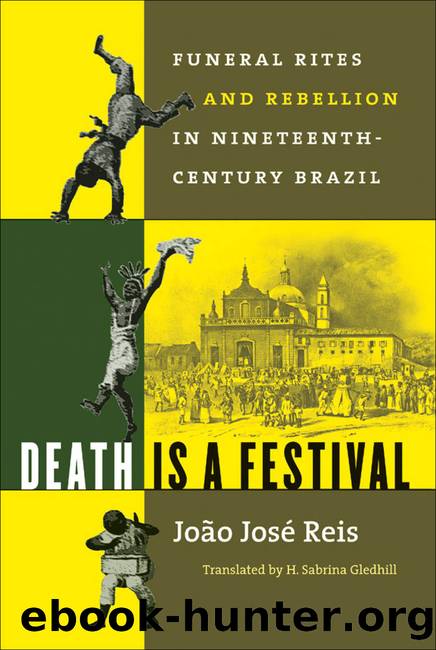Death Is a Festival by João José Reis

Author:João José Reis [Reis, João José]
Language: eng
Format: epub
ISBN: 9780807827734
Publisher: UNC Press
Published: 2003-09-15T05:00:00+00:00
CELESTIAL INTERCESSORS
The dead depended on the living to pray and to have masses said for the souls of the departed. However, wills also launched more direct means of propitiation: the intercession of saints. Probate records provide excellent evidence of how people envisaged their judgment in heaven. The main characters in this celestial drama were the individualâs soul, the defendant; God, the judge; and a myriad of saints and angels as defense attorneys. The punishment could be horrific: Francisco José Vieira Guimarães requested the intercession of various saints âso that the Devil shall not triumph over me or make me succumb.â Acquittal could mean being allowed into the âLand of the Kingdom of Glory,â as Pedro Gonçalves dos Anjos put it in 1823.52
The Church suggested that testators commend their souls to God, the Holy Trinity, and Christ and request the intercession of the Virgin Mary, angels, heavenly spirits, and saints. The commendations were almost rigidly formal, but the invocations were more varied, despite a certain formalism indicating the testatorâs devotional preferences. In Bahia, even former slaves invoked a legion of saints to help them attain the glory of heaven. Just 20 percent of the freedmen and -women studied by Katia Mattoso were not concerned with this matter. Rita Maria Joana de Jesus, from the African Benguela nation, in 1828 invoked her patron saint, Rita of Cascia; her guardian angel; the Virgin Mary; and the heavenly court to obtain a pardon from the âDivine Arbiterâ and to âfree [her] from the Infernal Enemy.â Rita de Jesus had thoroughly assimilated the Catholic faith.53
Josefa Maria da Conceição Alves dos Reis, a freedwoman originally from the Slave Coast who was a poor and childless widow, in 1819 made requests that displayed an original understanding of Christian doctrine. First, she commended her soul âto the holiest virgin, who created her,â a matriarchal interpretation of the mystery of life. However, Reis knew that her soul would be judged by the âEternal Fatherâ and made a direct request to the Son (âmy Lord Jesus Christâ) to act as her âintercessor and advocate.â She then cited the Holy Ghost and Holy Trinity among the âsaints of my particular devotionâ and disclosed that she had not one but many âGuardian Angels.â She begged all of them and St. Joseph (after whom she was named) for their aid in âpresenting my soul before the Divine Tribunal.â In some respects, Reisâs invocation includes archaic formulas, such as naming Jesus Christ as her intercessor and associating the Holy Spirit with the heavenly court, formulas that appeared in Europe as early as the sixteenth century. (In 1829 a canon, José Vieria de Lemos, produced the mixed-up archaism of calling Christ âour advocate,â âmy intercessorâ and âmy Judgeâ in the same sentence.)54
Reisâs invocations were even more original in other passages, such as her reference to the Holy Ghost in addition to the Holy Trinity and her belief that she was protected by more than one guardian angel. But the most original statement was her attribution
Download
This site does not store any files on its server. We only index and link to content provided by other sites. Please contact the content providers to delete copyright contents if any and email us, we'll remove relevant links or contents immediately.
| Belize | Costa Rica |
| El Salvador | Guatemala |
| Honduras | Nicaragua |
| Panama |
Cat's cradle by Kurt Vonnegut(15339)
Pimp by Iceberg Slim(14488)
4 3 2 1: A Novel by Paul Auster(12377)
Underground: A Human History of the Worlds Beneath Our Feet by Will Hunt(12090)
The Radium Girls by Kate Moore(12018)
Wiseguy by Nicholas Pileggi(5770)
The Fire Next Time by James Baldwin(5432)
Perfect Rhythm by Jae(5398)
American History Stories, Volume III (Yesterday's Classics) by Pratt Mara L(5301)
Paper Towns by Green John(5179)
Pale Blue Dot by Carl Sagan(4996)
A Higher Loyalty: Truth, Lies, and Leadership by James Comey(4954)
The Mayflower and the Pilgrims' New World by Nathaniel Philbrick(4495)
The Doomsday Machine by Daniel Ellsberg(4485)
Killers of the Flower Moon: The Osage Murders and the Birth of the FBI by David Grann(4436)
The Sympathizer by Viet Thanh Nguyen(4385)
Too Much and Not the Mood by Durga Chew-Bose(4338)
The Borden Murders by Sarah Miller(4313)
Sticky Fingers by Joe Hagan(4188)
